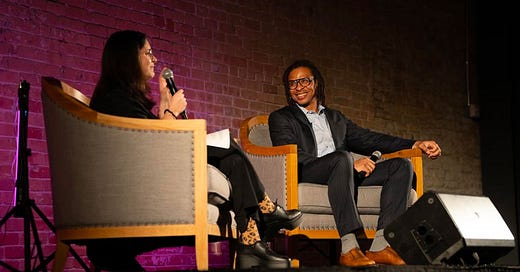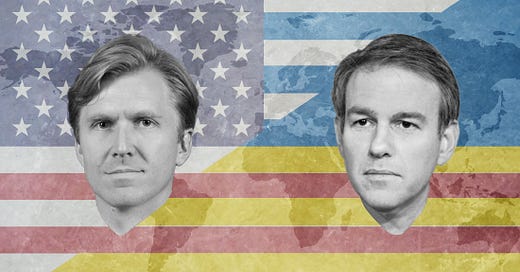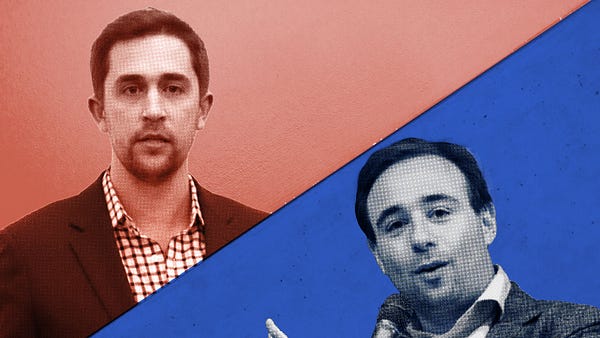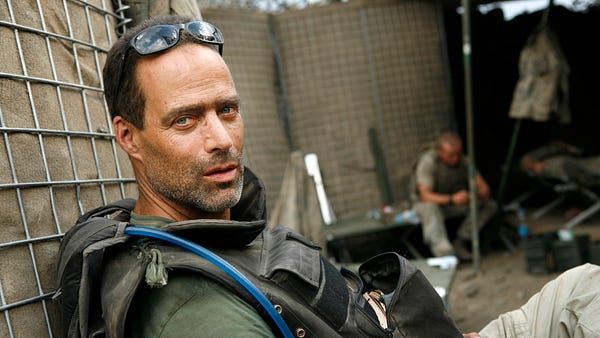
The Free Press

A little over two years ago, in the pages of The Free Press, Pano Kanelos announced that he was starting a new university in Austin dedicated to the fearless pursuit of truth. “We Can’t Wait for Universities to Fix Themselves. So We’re Starting a New One,” declared Pano. I was one of the founding trustees.
The announcement generated a lot of headlines. As expected, a lot of people dunked on it. They said, “why, in a country with thousands of colleges and universities, do we need a new one?” They said it was fake; they said we didn’t have real students. They said it was a “cancel culture grift.”
Two years later, not only is UATX a very real university but in 2024, the school will accept 100 students in the inaugural class—students who won’t just be consumers but founders.
To get a sense of what this school—and this cohort—is all about, there is no better thing to do than to listen to today’s episode: a conversation with Harvard economist Roland Fryer, recorded live last weekend in front of these prospective students.
Why? In part because Fryer embodies academic excellence. He’s one of the most celebrated economists in the world and is the author of more than 50 papers—on topics ranging from “the economic consequences of distinctively black names” to “racial differences in police shootings.” At 30, he became the youngest black tenured professor in Harvard’s history. At 34, he won a MacArthur Genius Fellowship, followed by a John Bates Clark Medal, which is given to an economist in America under 40 who is judged to have made the most significant contribution to economic thought and knowledge.
But also because Fryer has one north star, and that is the pursuit of truth, come what may—the pursuit of truth no matter how unpopular the conclusion or inconvenience to his own political biases. He’s also rare in that he isn’t afraid to admit when he’s wrong, or to admit his mistakes and learn from them.
As inspiring as Fryer’s commitment to the truth is his own life story. Fryer rose to academic celebrity status after a very tough start in life. He overcame abandonment by his parents at a young age and grew up in what he calls a “drug family.” Before Harvard, Fryer worked at McDonald’s—drive-through, not corporate. Based on every statistic and stereotype about race and poverty in America, he should not have become the things he became. And yet he did.
This conversation was inspiring, courageous, and long overdue. I hope you enjoy it as much as I did.
Scroll down for an edited transcript of part of our conversation, or click below to listen to the whole thing:
You can also watch our conversation here:
On how he succeeded despite his difficult childhood:
Bari Weiss: When you step back and look at your life—absent mother, alcoholic father who goes to jail, many of your closest relatives sent off to jail for dealing drugs—this is not a recipe for a successful life. How did you get out of those circumstances? What was the first step out, and did you realize it at the time?
Roland Fryer: I certainly didn’t realize it at the time. I wish there were an afterschool special moment. Because it would be a lot easier to explain to people. I was an athlete and that’s all I cared about. I played football from five years old all the way through college, and that gave me a lot of confidence and maybe a chip on my shoulder. I knew I was good at something. And so sometimes we’re in bad public schools and they say, “you’ll never be anything.” I was like, well, I’m really good on Friday nights. And so I just felt like I was going to be good at something, and I just never really bought into the idea that it was cool to be poor. People, when I was growing up, would say, “Oh, you got to go to prison because certain tattoos you can only get in prison.” I was like, “Well, I don’t want them.” It may sound crazy now. But people were going to prison because they thought it was cool. I did not.
I feel like I’ve never fit in anywhere. When I was back home, I loved hanging out with my family. The hard truth is, I’m 45 years old and there’s not a single person that I grew up with who is still alive. I am the oldest living family member. It’s weird. There is no home to go back to. But when I was there, I was always too precocious. I didn’t quite fit in. I would always question things. And my grandmother would kind of permit it, but she was a Southern black woman. So I would get like two questions and then she said, “Shut up.” And yet now I’m at Harvard and it’s also weird there for me.
But I will say this: I worked so hard once I realized I wanted to get out.
I took a Principles of Economics Course 101. It was taught by the former president of the university, who was amazing, and the course was at eight in the morning, and he had office hours at 7 a.m. I know now that he was screwing with us, but here I am every Monday and Wednesday at 7 a.m., and I go to his office, and we would debate everything. We would talk about the economics of welfare, the economics of integration, the economics of car price. It didn’t matter. And I fell in love. I’ve had a love affair with economics since that first class. And he is the first person in my entire life who told me I was smart.
I remember calling my grandmother and saying, “Hey, this guy says I’m smart, but you don’t seem to agree.” And she said, “Oh yeah, in a summer program once they said you tested as gifted. But I never told you because I didn’t want you to get a big head.” (That’s a Southern grandmother.)
I think that was the moment where I thought, maybe I can actually do this stuff. So I worked really hard trying to catch up. I worked like I was desperate. When I took my exams as a PhD student, I was sleeping in my office every other night. My professor said to me, “What are you doing? This is not healthy.” And I said, “What’s not healthy is if I don’t pass these exams, how am I going to eat?” And he looked at me like I was an alien. How could a student in a PhD program worry about eating?
Because he had no idea where I came from. And so that’s the level of desperation that I tried to keep for a very long time because I had those things I wanted to accomplish.
On the controversy surrounding a study on police use of force:
BW: When you came on my radar, it was for a paper that you wrote in 2016. Here was the title of it: “An Empirical Analysis of Racial Differences in Police Use of Force.” I would argue it’s probably the most controversial of your career so far. Tell us about that study. And you’ve called the results the most surprising of your career. Why is that?
RF: Can we change the language of “controversy.” I mean, do you mean “interesting”? I’m just showing you the data. The data are telling you a weird story. That’s not my fault. I’d like some nice, popular data. It just didn’t work out that way.
Look, I saw what was going on with Michael Brown and some of the early viral videos of police violence. I wanted to do something, but protesting is just not my jam. And so I thought, I’m one of the world’s biggest data nerds. So I said, this is going to be the easiest paper I ever write. I’m going to go get some data. I’m going to go show that the police are biased. Finally, people are going to like me and my grandmother is going to go, “You showed that the police don’t like black people. Really? What are you doing up there?”
And then I had dinner with a colleague of mine, and I was telling him about my plan, and he says, “Roland, it’s weird that you would just download police data and not understand more about the police.” He says, “I wonder what the police are maximizing?” A very econ kind of thing to ask.
And it dawned on me in that moment that I didn’t know, nor did I think I cared. So I said, okay, fine. So I set up ride-alongs in Camden, Philadelphia, Houston, and Massachusetts to ride along with the police.
Now back to 1991—I don’t like the police very much. I don’t.
BW: What had been your experience with the police?
RF: I had been roughed up by the police. I’ve had guns pulled on me. Mind you, they pulled me over and I decided it would be a good idea to get out of the car and walk away. The details are important, probably.
But in any event, I just didn’t like police. They took half my family away. Granted, they were selling a lot of drugs. . . . But I was biased against the police.
So I went [on the ride-alongs] and I don’t think I’ve received a better education since my grandmother taught me to read. Policing is a hard job. And I know that sounds obvious sitting on a stage. It’s a really hard job. After four hours [of ride-alongs], everyone looked like a criminal to me.
And those experiences helped me understand what types of data to collect. We collected millions of observations on everyday use of force that wasn’t lethal. We collected thousands of observations on lethal force. And the key question is not just these arbitrary, silly snapshots that some journalists do a lot, which is “black people are 13 percent of the population, and they are 50 percent of the police shootings.” I’m sorry about that, but I don’t know what that has to do with the question. And it was in this moment in 2016 that I realized people lose their minds when they don’t like the result.
What my paper showed was that yes, we saw some bias in the low-level uses of force—everyday pushing up against cars and things like that. People seem to like that result. But we didn’t find any racial bias in police shootings. That was really surprising to me because I expected to see it.
I had eight full-time RAs that it took to do this over nearly a year. When I found the surprising result, I hired eight fresh ones and redid it to make sure. They came up with the same exact answer, and I thought it was robust. And then my God, all hell broke loose.
People lost their minds. I had colleagues take me to the side and say, “Don’t publish this. You’ll ruin your career. I lived under police protection for about 30 or 40 days. I had a seven-day-old daughter at the time. I remember going to the grocery store to get diapers with an armed guard. It was crazy. It was really, truly crazy.
On having the courage to release unpopular research:
RF: I tell my undergraduates every year in the final lecture of my undergraduate classes: the key to Harvard is get a great education without letting this place change you. It’s really important. It can be corrupting. Every day I look at myself in the mirror and say, “What are you here for? What did you leave behind?”
I did not grow up wanting to go to Harvard. And I have suffered a lot of losses in my life. My grandmother is no longer here. My father is dead. I don’t know where my mother is. They’re all gone. Every single cousin is gone. The day my favorite cousin got released out of prison after 25 years, someone walked up behind him and shot him directly in the head. So I have to make this journey worth it. I am here because I want to solve problems. I am here because I have seen so much talent in these neighborhoods, and I know they know bullshit when they see it. So I’m not going to lie to them. I wouldn’t be able to show my face in these places if I told lies to them. Being an actual truth-teller is so very important. I didn’t go to Harvard to have chardonnay at 10:30 in the morning. I just don’t want to. It’s not my thing. I went there to make a difference. Truly, I know that sounds naive to many of you. But as I tell my students: remember when you came to Harvard, you had lofty dreams of changing the world. It wasn’t downside risk protection. Everybody I know who I’ve seen walk through those ivy doors rocks the boat until they get in the boat. And then they say, “Steady now.” I rocked the boat until I got in the boat, and I said, “Let’s see how fast we can go.” And I’ve fallen out of the boat, got run over by the boat, and it is what it is. But you got to be for something, right?
On his two-year suspension from Harvard (which ended in 2021):
BW: In 2017, Harvard opens an investigation into allegations from a former assistant who alleged sexual harassment in your communication. Ultimately, you’re suspended for two years without pay. That ended in 2021. I wondered if you wanted to reflect on any of that at all.
RF: What I didn’t understand—and now many of you will say it’s not possible for you not to understand this, and you are entitled to your opinion—is this thing called “power dynamics.” Truly. And so I honestly thought that I was creating a space for people to do whatever they wanted. To let creativity reign. That means they could talk about what they wanted to talk about. They could do whatever they wanted to do. And at that time, it’s not in my personality to go over to two people who seem to be enjoying an inappropriate conversation and say, “I don’t think that’s appropriate for the office.” And so I didn’t shut those kinds of conversations down. I thought this was a good thing. I honestly did. And I participated in a lot of jokes. And people were laughing. So it was a huge surprise to me that after a labor dispute that someone would say that “these conversations really damaged me and caused me harm.”
I can tell you that if anything I said caused someone earnest harm, my God, I have apologized over and over again for that. I didn’t realize at the time that there was a thing called “power dynamics” and all that. And so, yes, I made jokes that—it was shown that I made six jokes that were really terrible.
I did things wrong. It wasn’t because I had an evil heart. It was because I was ignorant. The day I heard about this thing called power dynamics, I started taking executive coaching literally that day. And I argued with the executive coach. I said, “Why would anyone laugh if it’s not funny?” I mean, we really went at it.
I learned a lot. I have apologized for those things, but it wasn’t more than jokes among people that I thought were friends. I mean, these people had Thanksgiving dinner at my house. I thought we could tell jokes. I should have known better.
I wear failure like a badge of honor. I really do. And I’m sure I’m going to keep failing. I’m going to keep trying.
On getting through that time in his life:
BW: How did you get through it? Many people would have gone through that experience and said, “I’m leaving Harvard.”
RF: I went back to Harvard so that everyone knows, here and everywhere else, that I could. Because there was a lot of obfuscation of facts. That was important to me. People reached out to me at the time and said, “Oh my God, this must be really, really hard.” It wasn’t. It was really, really annoying. Growing up without a mother is hard. And I’m never going to forget the difference. I remember what it was like to go to bed hungry. I vividly remember what it was like to go to bed scared. I know what gunshots sound like at night at 8 or 9 years old. That’s hard. Not people that I didn’t like anyway not wanting to talk to me anymore.
One hard part, though, was that I had a lot of people in the academy who I considered family because I didn’t really have any. And those people cut out. Still haven’t talked to them. Some of them have come back and said, “Hey, can we be friends again?” And I said, “No, we can’t.”
On Claudine Gay. . . and karma:
BW: One of the details in this story is that you were suspended by a woman who I had never heard of until recently. Her name is Claudine Gay. And she said this in a letter to the economics department at the time: “Professor Fryer exhibited a pattern of behavior that failed to meet the expectations of conduct within our community and was harmful to the well-being of its members. The totality of these behaviors is a clear violation of institutional norms and a betrayal of trust of the Harvard community.” So I guess I want to ask, do you believe in karma?
RF: I hear it’s a motherfucker.
BW: And also, does calling for the genocide of Jews constitute bullying and harassment? Yes or no?
RF: One thousand percent.
On whether his suspension was punishment for that 2016 study:
RF: I honestly haven’t thought too hard about that. I did a lot of things at Harvard people didn’t like. I broke a lot of glass. I’m not a company dude. I’m very clear about what my mission is. I am put on this earth to develop the truths about why we’re losing so much talent in disadvantaged neighborhoods and around the world. That’s what I’m here for. And so, I paid kids to learn. It’s okay now, but in 2007, this was crazy.
BW: Tell us what you mean, pay kids to learn.
RF: I went around in four or five different cities, spent $10 million in inner cities, giving kids financial incentives to do better in school.
BW: Did it work?
RF: Yes. A lot of adults didn’t like it. I never met a kid who didn’t think it was brilliant.
We also opened up bank accounts for them. But during that time, Harvard asked to take their names off the checks because they didn’t want to be associated with the research. People would ask me, “Roland, why don’t you spend more time with our graduate students?”
And I would say, “But look, if I don’t give them comments on their paper, there’s ten other people waiting here. What about the kids in these neighborhoods? I’m the only one going there from this department. You want to swap? I’m happy to give comments and you can go there.” I can understand why that rubbed people the wrong way.
I also don’t tolerate foolishness at all. So you can’t put me on a task force where we’re going to spend the semester talking about the new name for black people. I don’t want to do it. You go to my neighborhood and call someone BIPOC, they’ll punch you in the face. I care about the real issues. You know what’s offensive? Being unemployed. And so I have had that attitude throughout my career. I don’t plan on getting rid of it because I want to make sure we focus on the real issues. And I believe sometimes in universities, we start to focus internally on the things that are not helping the people that we said we came there to help.
On his advice for the next cohort of college students:
RF: I’ll just leave you with the same thing I tell my students at Harvard, which is remember why you came here. You can actually change the world. I get up every morning and believe that today is going to be the day. You can actually change the world. People are going to say things to you, maybe even your parents, like, “you can’t say stuff like that” or “be careful doing that.” Ignore them.
I’m going to wear my drama with my colleagues like a badge of honor. No one that I respect who’s actually changed the world did it with a golden road. Not one. Go back and look at history. Everyone who has done something big has suffered in some way for trying to do something that people thought was crazy. That’s okay.
You are going to have to figure out during your time here how to strike the balance between listening and not listening. And it is harder than you might imagine because some advice should be listened to and a lot of it should not.
I had a mentor of mine tell me about two years in at Harvard, “Don’t listen to me anymore. Follow your gut from here on out.” And you’re going to have to figure out when that time is for you.
You are not alone. If you want to change the world, you will never be alone.
There was a period in my life where everything I did every day, people told me it was wrong. I tried to reform schools in Houston, and people picketed me outside my house and said, “Roland Fryer is the worst thing for black people since the Tuskegee experiments.” And during my down days, I would call my friend Geoff Canada and I’d say, “Hey, Geoff, what color is the sky?” And he’d say, “It’s blue.” And I’d say “thank you,” and I’d hang up. Because sometimes when you’re trying to change the world, you look up to the sky and you see this beautiful blue sky. And everybody in your life says, “Oh, that’s a nice shade of purple.” And you’re like, “Why don’t you see what I see?”
Stay strong during those times. You are not alone. I want you to change the world. The world needs you to change it.
For more stimulating conversations, become a Free Press subscriber today:
















I'm so glad I took the time to read this article (and the comments).
Great interview!I believe you introduced us to this generation’s Thomas Sowell!